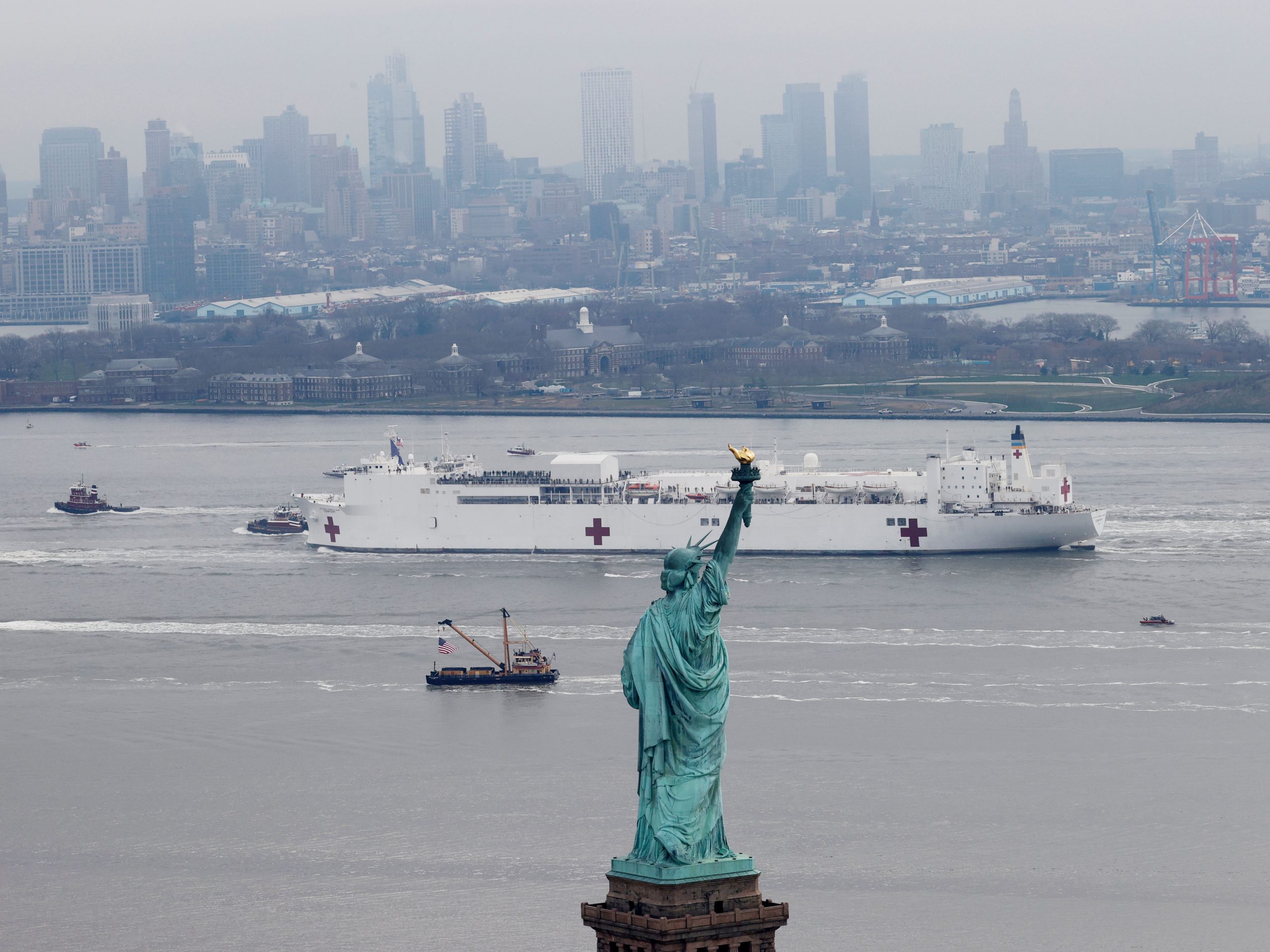The COVID-19 pandemic is an acute public health and economic crisis that is further destabilizing an already weakened rules-based international system. With cooperation, determination, and resolve, however, the United States and its allies can recover from the crisis and revitalize an adapted rules-based system to bring about decades of future freedom, peace, and prosperity.
1. The System
The Headline: Since the end of World War II, the free world has been governed by a system of rules—some formal, others informal. This system has been sustained by determined leadership on the part of the United States and its allies and partners across the globe.
These rules—which shape financial systems, trade, diplomacy, and the resolution of disputes between nations—have led to what generations before us would have believed impossible.
Over the past seventy-five years, democracy and freedom have expanded, a smaller percentage of people have been killed in war than in any other period in modern history, and the world’s wealth has grown like never before.
2. The Problem
The Headline: Unsurprisingly, after all these years, the system is fraying. When the system was established, there was no Internet, warfare looked different, and alternative power dynamics ruled the world. The global balance of power has since shifted away from the United States and Europe toward Asia. Technology, such as social media, enables the rapid mobilization of protest movements, while artificial intelligence gives authoritarian governments new tools with which to control populations.
To accommodate these new players, powers, and influences, it is necessary to revitalize and adapt a rules-based system that has served the world for so long before the gains are lost.
3. The Opportunity
The Headline: The COVID-19 pandemic is gripping the world today. It is hardly the first pandemic the world has faced, and certainly not the deadliest, but it needs a solution that can best be reached by strengthening the rules-based system.
Out of that revitalization, the world can experience a rebirth, just as the Renaissance emerged from the trauma of the Black Death in the fourteenth century.
With crisis comes opportunity. Now is a chance to rebuild a stronger, more resilient rules-based system that can meet the challenges of the twenty-first century.
4. Under Pressure
The Headline: Even before the COVID-19 pandemic, a rules-based system created by the United States and its partners after World War II had morphed under pressure. Russia and China, uncomfortable with the system’s values, have tried to undermine it. Iran and North Korea have strived to destabilize it.
There are other challenges as well. Many in the United States and Europe are angry at the system. They feel cheated as jobs go elsewhere. Fueled by this anger, populist movements have grown stronger. US global leadership is also increasingly being questioned. Long-standing partnerships and alliances, such as the transatlantic relationship, have become strained.
5. Shocked and Battered
The Headline: The COVID-19 pandemic is battering an already weakened world order. The novel coronavirus continues to claim lives across the globe. Trust in governments and global institutions, which are supposed to protect us from crises like this, is falling. The world’s economy is facing a downturn worse than the one it faced just over a decade ago.
Important relationships are fraying or bursting apart. Tensions between the United States and Europe, longtime partners, are rising. The US-China rivalry is intensifying. International institutions, such as the World Health Organization, have struggled to organize a cooperative response to the pandemic. Autocrats are using the crisis as an opportunity to strengthen their grip on power.
6. A Gravely Ill System
The Headline: Although the rules-based system is broken and ailing, it is not dead. It will not be enough to rebuild it as it once was. The rules-based system needs to be reimagined and adapted to the needs of the twenty-first century. It must be more resilient to better protect people from health crises. The benefits of prosperity should be available to everyone. Freedom should be revitalized and secured around the world.
7. Three Roads Diverged
The Headline: There are three roads before us. The first is the path to disorder: Recovery is slow, nations turn inward, the world becomes more closed, and armed conflict becomes more likely. The second is the path to a China-led world: The United States declines, and China defines the values of the post-pandemic global order.
The final path is one of recovery and rejuvenation: the United States and its allies and partners once again rise to the occasion to establish and sustain a revitalized and reformed system marked by peace, prosperity, and freedom for decades to come.
8. Building Back Better
The Headline: Following the third road requires first defeating the virus and getting people back to work. As we recover, we should embrace this historic opportunity to strengthen and adapt the rules-based system so that it works for everyone.
Now is the time to be both practical (instituting measures to meet immediate needs) and aspirational (ensuring the system recommits to and upholds, freedom, justice, democracy, and security.)
KEY ELEMENTS
9. Reaping the Benefits
The Headline: After World War I, the United States turned away from the world. The Great Depression and World War II followed. After World War II, the United States worked with allies and partners to create a stable international system.
The rules-based system established after World War II brought great benefits. For decades, allied military forces have supported US troops in combat. The open economic system created millions of jobs and boosted incomes in the United States. Americans have been able to freely travel, study, and explore the world.
There is now a new opportunity. By once again leading and working with partners, the United States can bring about decades of even greater peace, prosperity, and freedom for the world and secure the benefits of a revitalized system for all of its citizens.
KEY ELEMENTS
10. A Healthier World
The Headline: Unilateral attempts to conquer COVID-19 may eventually lead to a vaccine but are also sure to take longer, not reach everyone—putting the world in danger of renewed infection—and cause avoidable strain among nations. They will also lead to a deadly competition for resources, including for the vaccine itself.
What is the path forward? Create a Counter-Coronavirus Coalition of like-minded nations that not only takes on the virus worldwide but also seizes the opportunity to reform and strengthen a faltering global health system. New institutions will need to be built, and norms of transparency, cooperation, and accountability must be re-instilled in existing entities such as the World Health Organization.
Done correctly, the new system will be capable of spotting and mitigating the next virus outbreak before it turns into a global calamity, and provide better health care for all.
KEY ELEMENTS
11. Prosperity and Opportunity for All
The Headline: COVID-19 has flooded hospitals and drowned economies. Countries, for the most part, have gone it alone in looking for answers. The results have been mixed.
What is a better solution? The answer lies in working together on economic stimulus and containing the disease. Trade is the key to prosperity and slows to a trickle when partners are mired in recession. Now, there is a chance to not just build back, but, working through organizations like the G7 and G20, to build a better system. Like-minded nations can work together to establish new institutions, promote truly fair trade, and create a more level playing field while limiting the influence of unfair actors such as China.
The United States and its partners must also prepare for imminent transformations in the global economy. Over the next decade, new technologies such as artificial intelligence and biotechnology will shape the world economy. As the United States moves from economic recovery to growth and rejuvenation, it should strive to remain the center of innovation in the world.
KEY ELEMENTS
12. Freedom and a Voice for Everyone
The Headline: Autocrats are exploiting the COVID-19 pandemic to strengthen their grip on power, ostensibly to “protect” their people, but there is also an opportunity to strengthen democracy.
The pandemic has further weakened wobbly international institutions. The world’s leading democracies should come together to form new organizations to deal with relations between nations, technology, and trade: a D10 of leading democracies, an Alliance of Free Nations, a free world technology alliance, and a Free World Free Trade Agreement.
But it is not enough for the nations of the free world to work together on their own. They must also reach out to China and other nations to find points of agreement and areas where it is possible to cooperate.
KEY ELEMENTS
13. Securing Our Future

The Headline: With US sailors and soldiers sick and exercises canceled, rivals may mistakenly believe COVID-19 has left the United States weakened. To counteract this notion and strengthen deterrence, the United States must be vocal in its diplomacy and display its military might.
The United States must also look to the future, taking biological threats into account—both man-made weapons and naturally occurring pandemics. More defense spending must go into research and development in these areas, and greater efforts should be made to deter potential bad actors.
Now is also the time for the US military to reassess some of its spending priorities as the economic slowdown is likely to put pressure on defense budgets. Legacy weapons systems, such as aircraft carriers, must take a back seat. Instead, cybersecurity, artificial intelligence, unmanned systems, hypersonic missiles, quantum computing, directed energy, advanced manufacturing, space-based sensors, and missile defense interceptors should be given priority.
KEY ELEMENTS
14. A Team Effort

The Headline: This is a strategy for everyone who wants to live in a peaceful, secure world and ensure that the pursuit of happiness remains a fundamental right. Achieving it requires the will and commitment of world leaders and ordinary citizens alike. The Greatest Generation, which endured the Great Depression and World War II, left their children a better world. Their courage and sacrifice should inspire us as we embark on this effort to reshape a rattled world together.
No comments:
Post a Comment